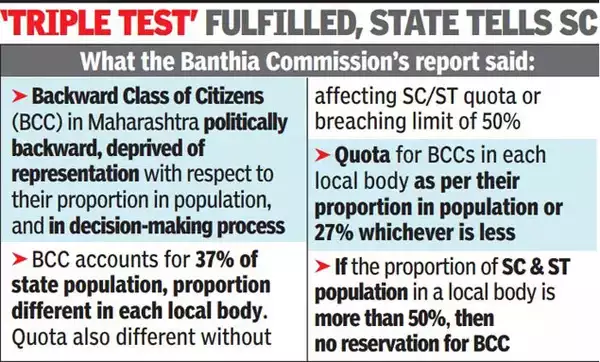Ahmedabad
(Head Office)Address : 506, 3rd EYE THREE (III), Opp. Induben Khakhrawala, Girish Cold Drink Cross Road, CG Road, Navrangpura, Ahmedabad, 380009.
Mobile : 8469231587 / 9586028957
Telephone : 079-40098991
E-mail: dics.upsc@gmail.com

OBC reservation in Local Bodies
News: Recently, the state government of Gujarat hiked reservations for Other Backward Classes (OBCs) from the existing 10% to 27% in the panchayats and urban local bodies.
Key Highlights:
• The decision followed recommendations of the Justice K S Jhaveri Commission that was formed in response to a Supreme Court (SC) directive in 2022 to make suggestions for OBC reservation in local bodies in Gujarat.
• The expanded 27% OBC reservation will apply to all levels of local bodies (municipal corporations, municipalities, gram panchayats, taluka panchayats, and district panchayats).
• The increased OBC reservation, however, will not be applicable in areas covered by the PESA Act 1996 where the scheduled tribe (ST) population exceeds 50%. In such regions, OBC candidates will receive a 10% reservation.
• The existing quota for SCs (14%) and STs (7%) remains unchanged without any breach of the 50% reservation ceiling as mandated by the SC.
What is Supreme court’s view about reservation in Local Bodies?
• In the five-judge Constitution Bench decision in K. Krishnamurthy (Dr.) v. Union of India (2010), the SC interpreted Article 243D(6) and Article 243T(6), which permit reservation by enactment of law for backward classes in panchayat and municipal bodies respectively.
• The SC also held that the barriers to political participation are not the same as the barriers that limit access to education and employment.
• Article 15 (4) and Article 16 (4) form the basis for reservation in education and employment.
What are pros of OBC reservation in Local body polls?
• Skill and leadership development
• Exposure and raises political awareness
• Empowerment, inclusion and participation
• Long-term development
What are cons of OBC reservation?
• Caste-Based Division - Some opponents contend that caste-based reservations perpetuate divisions within society, emphasising differences rather than fostering unity.
• Impact on Local Governance - There are apprehensions about political considerations outweighing governance concerns when candidates are elected through reservations. This could hinder effective decision-making and the overall development of local bodies.
• Disadvantaged Groups Within OBCs - There is concern that within the OBC category, some groups may be more privileged (creamy layer) than others.

Address : 506, 3rd EYE THREE (III), Opp. Induben Khakhrawala, Girish Cold Drink Cross Road, CG Road, Navrangpura, Ahmedabad, 380009.
Mobile : 8469231587 / 9586028957
Telephone : 079-40098991
E-mail: dics.upsc@gmail.com
Address: A-306, The Landmark, Urjanagar-1, Opp. Spicy Street, Kudasan – Por Road, Kudasan, Gandhinagar – 382421
Mobile : 9723832444 / 9723932444
E-mail: dics.gnagar@gmail.com
Address: 2nd Floor, 9 Shivali Society, L&T Circle, opp. Ratri Bazar, Karelibaugh, Vadodara, 390018
Mobile : 9725692037 / 9725692054
E-mail: dics.vadodara@gmail.com
Address: 403, Raj Victoria, Opp. Pal Walkway, Near Galaxy Circle, Pal, Surat-394510
Mobile : 8401031583 / 8401031587
E-mail: dics.surat@gmail.com
Address: 303,305 K 158 Complex Above Magson, Sindhubhavan Road Ahmedabad-380059
Mobile : 9974751177 / 8469231587
E-mail: dicssbr@gmail.com
Address: 57/17, 2nd Floor, Old Rajinder Nagar Market, Bada Bazaar Marg, Delhi-60
Mobile : 9104830862 / 9104830865
E-mail: dics.newdelhi@gmail.com